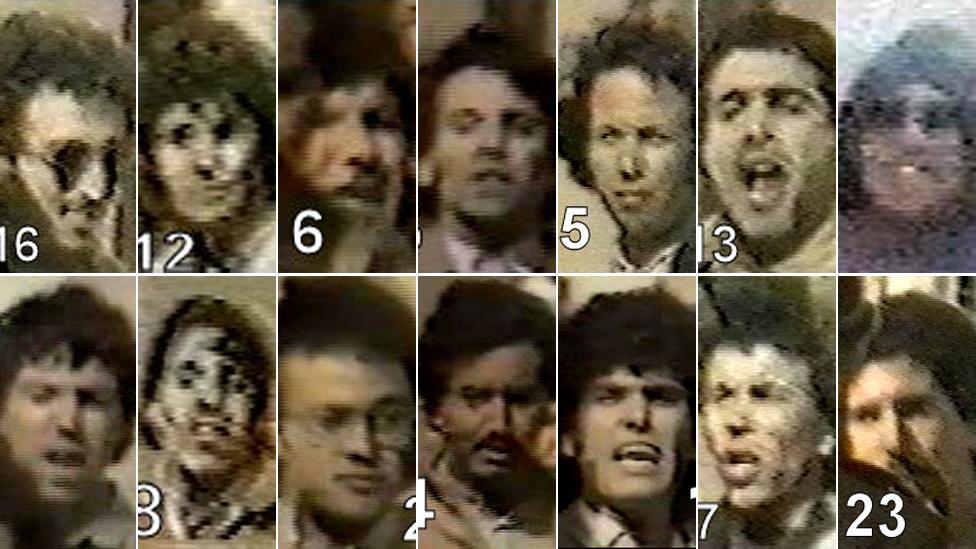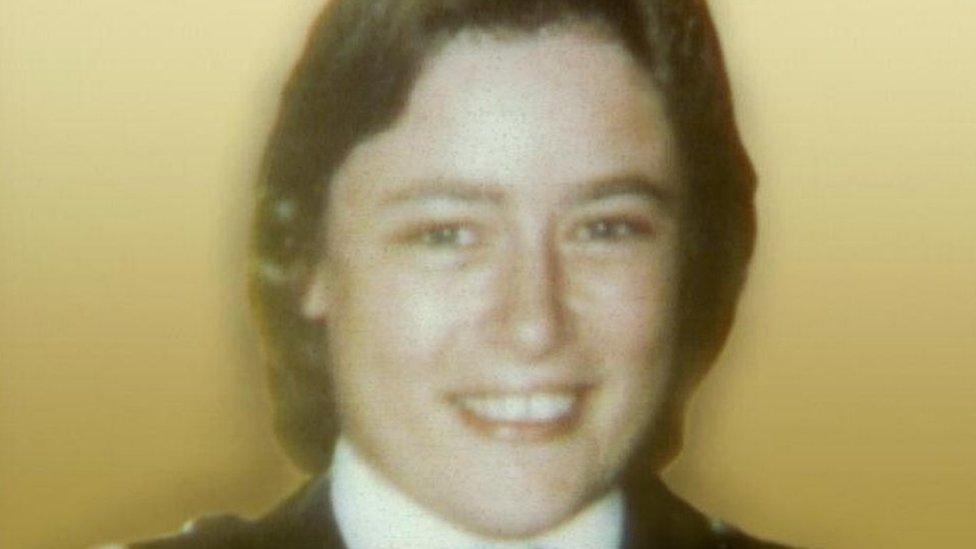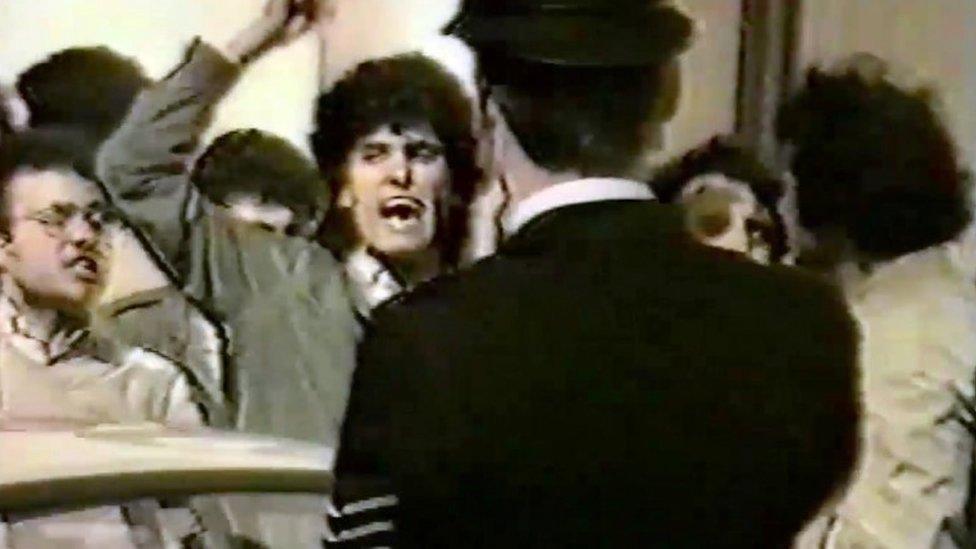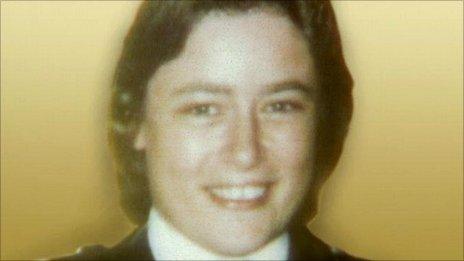PC Yvonne Fletcher shooting: Libyan man arrested in UK
- Published
How the BBC reported the shooting of PC Yvonne Fletcher in 1984
A Libyan man has been arrested on suspicion of conspiracy to murder PC Yvonne Fletcher three decades ago.
PC Fletcher, 25, died after being shot while policing a demonstration outside the Libyan Embassy in London in 1984.
Scotland Yard described the arrest of the man, in his 50s, as a "significant development".
He was detained on Thursday morning in south-east England and is in custody. He was also held on suspicion of money laundering.
Two other Libyan nationals - a woman in her 40s and a man in his 30s - were also arrested on suspicion of money laundering at separate addresses in London and south-east England.
They were later released on bail pending further enquiries, Scotland Yard said.
PC Fletcher's family said in a statement that her father Tim had recently died, with his "one regret in life" being that he had "never witnessed any justice".
The Met is offering a reward, external of up to £50,000 for information.

Scotland Yard wants to trace these individuals as part of its inquiry
PC Fletcher was one of 50 officers policing a protest against Col Muammar Gaddafi's regime outside the embassy when she was hit by a burst of gunfire from a first-floor window.
The death of Gaddafi in 2011 and the subsequent regime change provided new lines of enquiry, with police visits to Libya since then unearthing "new and fresh evidence".
The force has released images of 14 people they want to trace from a pro-Gaddafi group, which was holding a counter-demonstration nearby.
'Darkest day'
Video footage of the demonstration and shooting has also been released.
The 54-second clip shows the chaotic moments after shots were fired, with dozens of demonstrators falling to the ground after a loud bang is heard.
Commander Richard Walton, head of counter-terrorism at Scotland Yard, said: "The day Yvonne was shot remains one of the saddest and darkest days in the history of British policing.
"We have never lost our resolve to solve this case and to bring to justice those who conspired to commit this act of murder."
He said a number of shots were fired at 10:17 on the morning of 17 April, 1984, hitting PC Fletcher in the back. Ten anti-Gaddafi campaigners were also injured in the shooting.
Mr Walton said a pistol and an automatic weapon are thought to have been used. Police believe the shooting was part of the "stray dogs campaign" arranged from Libya to attack overseas dissidents.

The family of PC Fletcher has also appealed for information
PC Fletcher's family said: "Recently we have had to come to terms with another loss through the death of Yvonne's father, Tim.
"His one regret in life was that no one had been arrested... [he] never witnessed any justice.
"Resolving this crime is still important to all the family.
"Any information, however small, can help bring closure for the family and we therefore continue to support the Metropolitan Police in their ongoing investigation."
'Examine consciences'
Mr Walton appealed for anyone in the area of the embassy, in St James's Square, on the day of the shooting to contact police - even if they had already done so in the past.
He said: "In particular, we want to speak to those who attended the Libyan People's Bureau on the day... to protest, either against or in favour of Gaddafi.
"There were a number of witnesses who were part of the pro-Gaddafi counter-demonstration, orchestrated from within the Libyan People's Bureau, whom we have never spoken to.
"We appeal particularly to these people to come forward and speak to us now, even after 31 years."

Footage released by the Met shows the demonstration outside the embassy shortly before PC Fletcher was shot
The shooting of PC Fletcher sparked an 11-day siege of the Libyan embassy.
Because of diplomatic immunity, the Met could not search the bags of the diplomats and staff who were subsequently deported.
Diplomatic ties between Libya and the UK were severed following the killing.

Timeline of events and developments in the investigation
17 April 1984: PC Fletcher is killed while policing a demonstration outside the Libyan embassy in central London. An 11-day siege begins and diplomatic links with Libya are brought to an immediate end. When the siege ends all Libyan diplomats make their way out of the embassy and are given diplomatic immunity.
7 July 1999: The Libyan government accepts "general responsibility" for the shooting of PC Fletcher and offers to pay compensation to her family. The next day, Scotland Yard announces it is to reopen the investigation into PC Fletcher's death.
2 May 2002: Scotland Yard officers fly to Libya as part of the investigation into PC Fletcher's death but return with no real leads to follow.
25 March 2004: Tony Blair meets Colonel Gaddafi in Libya for talks, and the then foreign secretary Jack Straw announces that Met police officers will fly there on 3 April 2004, in a fresh attempt to find PC Fletcher's killer.
14 September 2009: Details are released on a deal between the British and Libyan governments in 2006, agreeing that any murder suspects will be tried in Libya. PC Fletcher's family say they knew about the deal and "feel in no way misled" by it.
11 May 2012: Two Met counter-terrorism detectives travel to Libya, to continue investigations.
3 January 2014: Papers on the killing, released under the 30-year rule by the National Archives, reveal that the day before the killing Libyan officials were warned three times about potential violence if the demonstration went ahead.
19 November 2015: Scotland Yard says a Libyan man in his 50s is arrested on suspicion of conspiracy to murder PC Fletcher. Police offer a reward of up to £50,000 for information about the killing.
- Published17 April 2014
